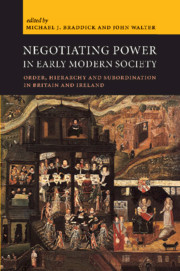Book contents
- Frontmatter
- Contents
- Notes on contributors
- Acknowledgements
- List of abbreviations and conventions
- Introduction. Grids of power: order, hierarchy and subordination in early modern society
- 1 Ordering the body: illegitimacy and female authority in seventeenth-century England
- 2 Child sexual abuse in early modern England
- 3 Sex, social relations and the law in seventeenth- and eighteenth-century London
- 4 Exhortation and entitlement: negotiating inequality in English rural communities, 1550–1650
- 5 Public transcripts, popular agency and the politics of subsistence in early modern England
- 6 ‘Bragging and daring words’: honour, property and the symbolism of the hunt in Stowe, 1590–1642
- 7 Administrative performance: the representation of political authority in early modern England
- 8 Negotiating order in early seventeenth-century Ireland
- 9 Order, orthodoxy and resistance: the ambiguous legacy of English puritanism or just how moderate was Stephen Denison?
- 10 Making orthodoxy in late Restoration England: the trials of Edmund Hickeringill, 1662–1710
- Notes
- Index
4 - Exhortation and entitlement: negotiating inequality in English rural communities, 1550–1650
Published online by Cambridge University Press: 13 March 2010
- Frontmatter
- Contents
- Notes on contributors
- Acknowledgements
- List of abbreviations and conventions
- Introduction. Grids of power: order, hierarchy and subordination in early modern society
- 1 Ordering the body: illegitimacy and female authority in seventeenth-century England
- 2 Child sexual abuse in early modern England
- 3 Sex, social relations and the law in seventeenth- and eighteenth-century London
- 4 Exhortation and entitlement: negotiating inequality in English rural communities, 1550–1650
- 5 Public transcripts, popular agency and the politics of subsistence in early modern England
- 6 ‘Bragging and daring words’: honour, property and the symbolism of the hunt in Stowe, 1590–1642
- 7 Administrative performance: the representation of political authority in early modern England
- 8 Negotiating order in early seventeenth-century Ireland
- 9 Order, orthodoxy and resistance: the ambiguous legacy of English puritanism or just how moderate was Stephen Denison?
- 10 Making orthodoxy in late Restoration England: the trials of Edmund Hickeringill, 1662–1710
- Notes
- Index
Summary
‘Go and see the miseries of our poore brethren’, insisted John Rogers, minister of Dedham (Essex), a community said in 1628 to consist ‘onlie of a number of Clothyers and a great Companye of poore people w[hi]ch are by them sett on worke’.
See their ruinous and cold houses, poore fire to make amends with, empty cupboards, thin clothing and so neare the wind, cold lodging, slender covering, and to see what exceeding paines some take early and late, to see others in how great pain and affliction they lie, and how little to comfort them.
‘If our heart be not made of an Adamant’, Rogers argued, ‘this will move us.’ Such vivid descriptions of unrelieved poverty, drawing as they did on a venerable tradition of clerical exhortation in which rehearsal of the miseries of the poor was intended to inspire compassion, were missionary in intent. ‘See’, John Downame lamented in 1616, ‘their small provision, hungrie fare, thinne cloathes, and hard lodging, the children crying for hunger, and the parents out crying them because they have no food to give them.’ Downame's description of poverty also, however, betrayed the contemporary tendency to classify ‘the poore’, in this case into three categories: ‘some lying in straw for want of beddes; others drinking water instead of drinke; and a thirde sorte neere starved with hunger for want of bread, or escaping that, quaking or shivering with cold for lack of fire’. For these early Stuart clergymen, then, the poor were readily identified and their plight easily improved. So long as the rich were compassionate, misery could be mitigated.
- Type
- Chapter
- Information
- Negotiating Power in Early Modern SocietyOrder, Hierarchy and Subordination in Britain and Ireland, pp. 102 - 122Publisher: Cambridge University PressPrint publication year: 2001
- 2
- Cited by

